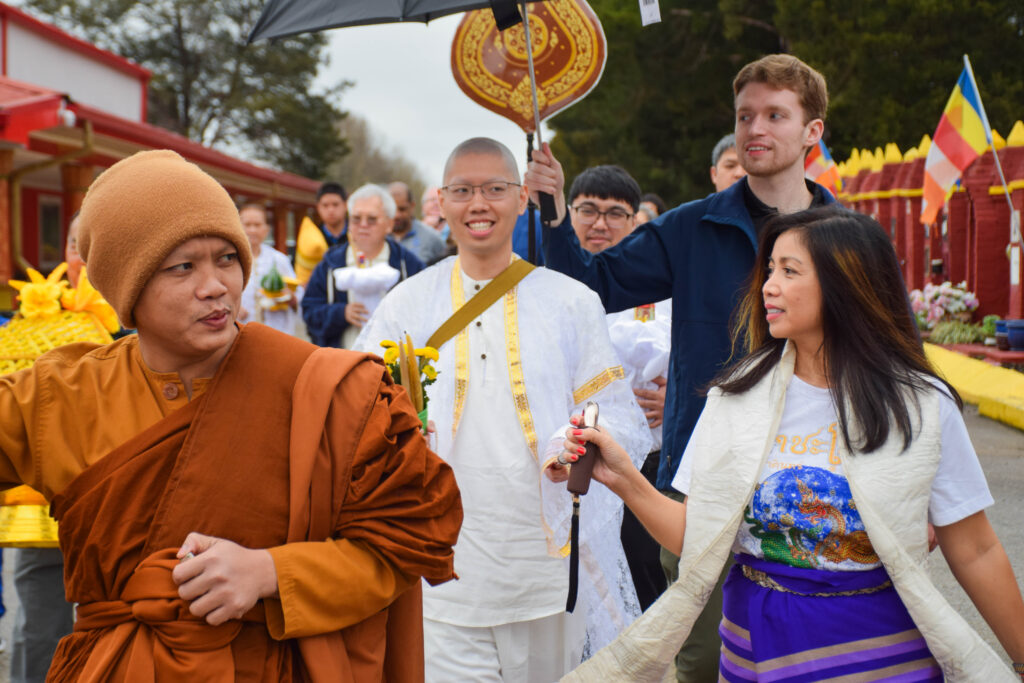
It’s 7 a.m. on a brisk, cloudy morning at Wat Lao Buddharam, a Buddhist temple in Murfreesboro. Don Srisuriyo stands on the porch of the wihan — the temple’s large, red-roofed meeting house — in a white robe. The 26-year-old student affairs coordinator at Middle Tennessee State University is about to be temporarily ordained as a Buddhist monk.
To achieve temporary monkhood, Don will undergo the Naga Ordination Ceremony. It’s considered a rite of passage for young men in Thailand, but it largely has not carried over to Thai communities in the U.S.
The first step is losing his mane of flowing black hair.
 Rachel Iacovone WPLN News
Rachel Iacovone WPLN NewsLoved ones place pieces of Don’s hair on a collection plate.
Don’s friends and family form a single-file line behind him, each cutting off a lock.
 Rachel Iacovone WPLN News
Rachel Iacovone WPLN NewsDon’s partner, Kylie, snips off a lock of his hair.
A monk does a once-over with electric clippers, then finishes the job with a manual razor and shaving cream. Even the eyebrows have to go.
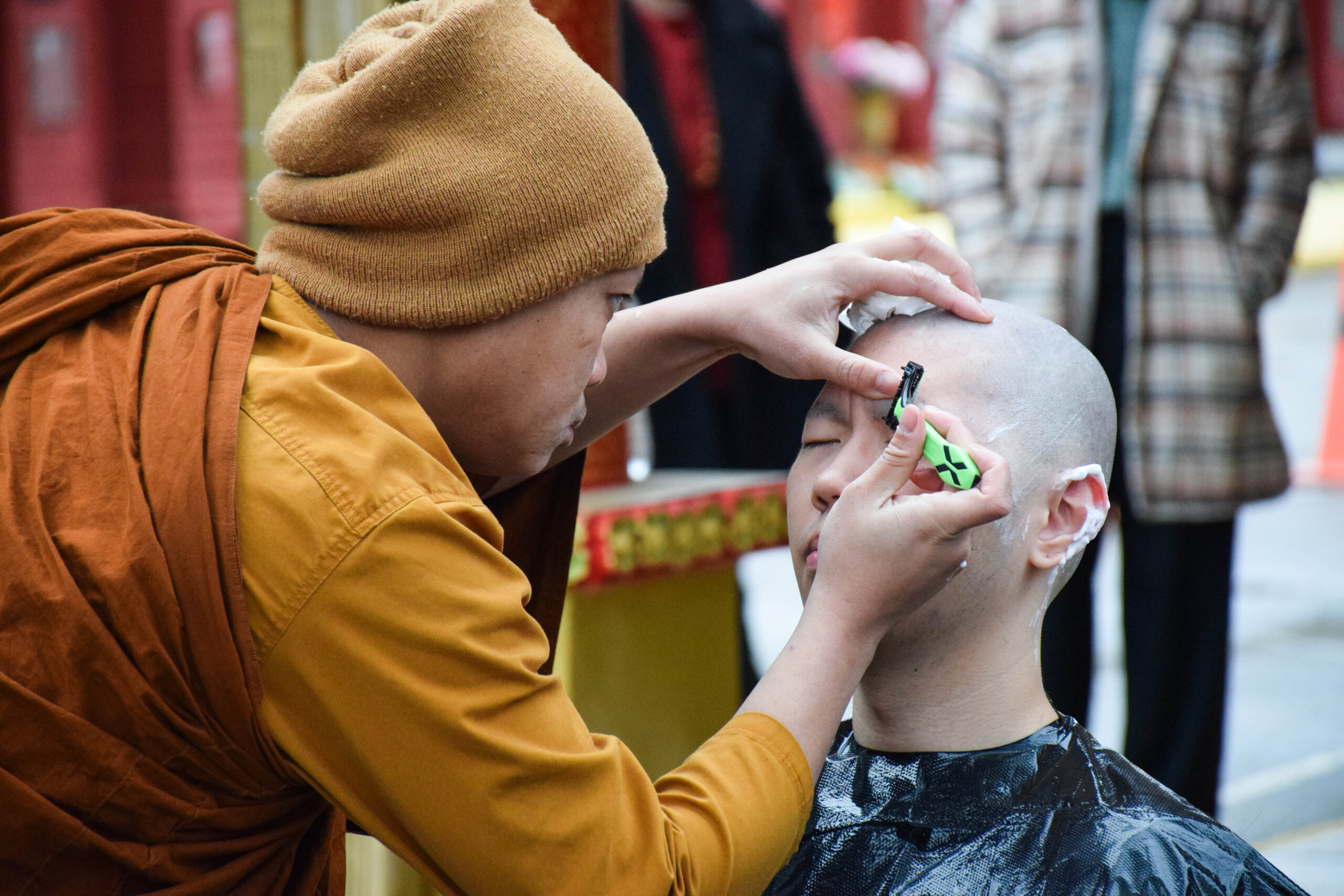 Rachel Iacovone WPLN News
Rachel Iacovone WPLN NewsOne of the monks shaves Don’s eyebrows with a closer razor after going over them with the electric.
The head-shaving is just one in a series of challenges Don will face. After today’s ceremony, he’ll spend a week at the temple, where he has to abide by the same rules as the rest of the monks.
As Don’s father, Lee Srisuriyo, explains, the rules are complicated — and strict.
“When he become a monk, he cannot touching women. Any women, even their mom,” he says. “You can eat from 6 a.m. to 12 p.m. only. And after 12, you can drink only water.”
A multi-step rite of passage
The ceremony moves inside, where family and friends take turns tying pieces of string around Don’s arm. Each string represents a blessing.
 Rachel Iacovone WPLN News
Rachel Iacovone WPLN NewsA loved one ties a string onto Don’s wrist, already full of blessings from family and friends.
Then back outside, where Don leads a parade — three laps around the temple. Someone wheels around a speaker, and people throw coins wrapped in shiny foil.
 Rachel Iacovone WPLN News
Rachel Iacovone WPLN NewsOne of guests at the ceremony rears back to throw another handful of lucky coins.
Don’s parents each hold a spiritually significant item during the parade: a cane for his mother and a large ceremonial vase for his father. His childhood friend, Alex, holds an umbrella over his head — meant to protect him from any wounds or injuries, which could prevent him from becoming a monk, and from the light drizzle that’s falling. There’s some gentle ribbing involved.
“We can’t have too much moisture get on that head of yours,” Alex says.
In the temple’s ubosot, or ordination hall, Don has to repeat a long prayer in Pali, the language of some Buddhist scripture. Then, the temple’s monks chant a series of prayers, a ritual which takes a couple of hours to complete.
 Rachel Iacovone WPLN News
Rachel Iacovone WPLN NewsDon recites prayers back to the monks in the temple’s ubosot.
The final part of the ceremony involves Don’s family giving alms of food and toiletries to each monk at the temple. The monks rely entirely on donations from the community.
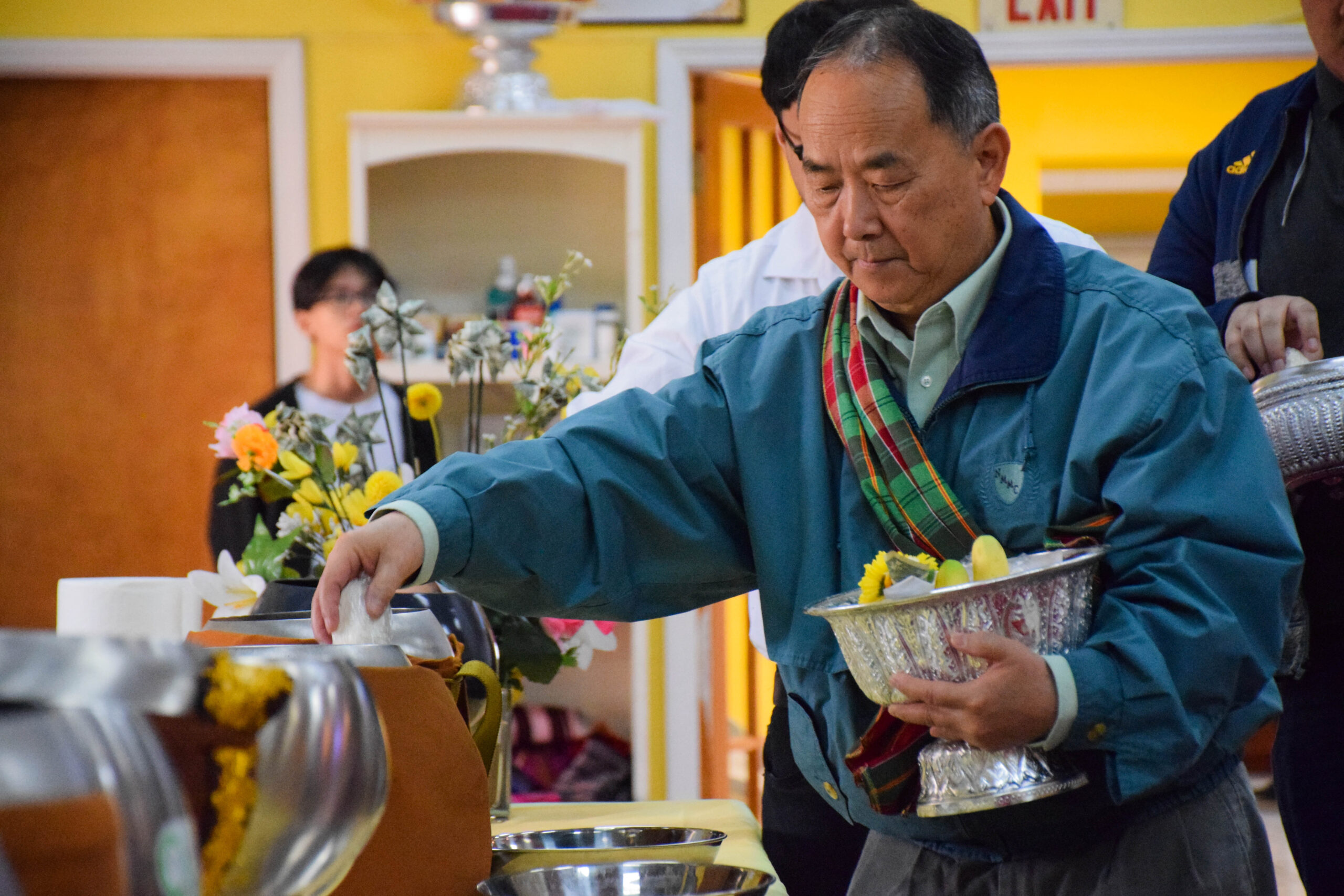 Rachel Iacovone WPLN News
Rachel Iacovone WPLN NewsDon’s father, Lee, places offerings into each monk’s alms container.
Don’s mother, Ann Srisuriyo, says shopping for the ceremony, including the offerings and some special religious items, was a full-time job.
“Oh my gosh. I have been preparing for this ceremony for months,” she says. “In the past three weeks, I have been shopping every day because I need to get everything ready. So many things to do, so many things to buy, too many foods to cook. The white robe that he wore, we bought it from Thailand. His cousin bought it and sent it to to us. We cannot buy it here.”
But the special day is worth the cost.
“I am so proud of my son. This is what he wanted to do for us. We didn’t even ask him to do it. He’s always been a good kid. I’m always proud of him,” she says.
 Rachel Iacovone WPLN News
Rachel Iacovone WPLN NewsDon’s parents, Ann and Lee, present him with the burnt-orange robes, which signal his ascension to monkhood.
A ‘generous spirit’
The rigor, and the costliness, of the ceremony are some of the reasons Thai Americans don’t often undergo this ritual.
In Thailand, men often go through the Naga Ordination Ceremony at age 20. At 26, Don is a bit older than average. He had to set aside a week off of work for his stay at the temple. And his family had to confer with the monks to find a spiritually suitable date for the ceremony.
There also aren’t many monks in the U.S. that rank highly enough to perform the ordination. Don says it’s been at least 10 years since the last one at Wat Lao Buddharam. But Middle Tennessee State University, where he works, has a large population of Thai students, and Murfreesboro has a sizable community from another Buddhist country: Thailand’s neighbor, Laos.
And becoming a temporary monk has great spiritual significance in Southeast Asian Buddhism. Don’s father, Lee Srisuriyo, explains that, if men do it while they are still unmarried, it’s believed to help their parents in the afterlife.
“If he become a monk, that mean that mom and dad will go to heaven when they pass away. That’s what it is,” he says.
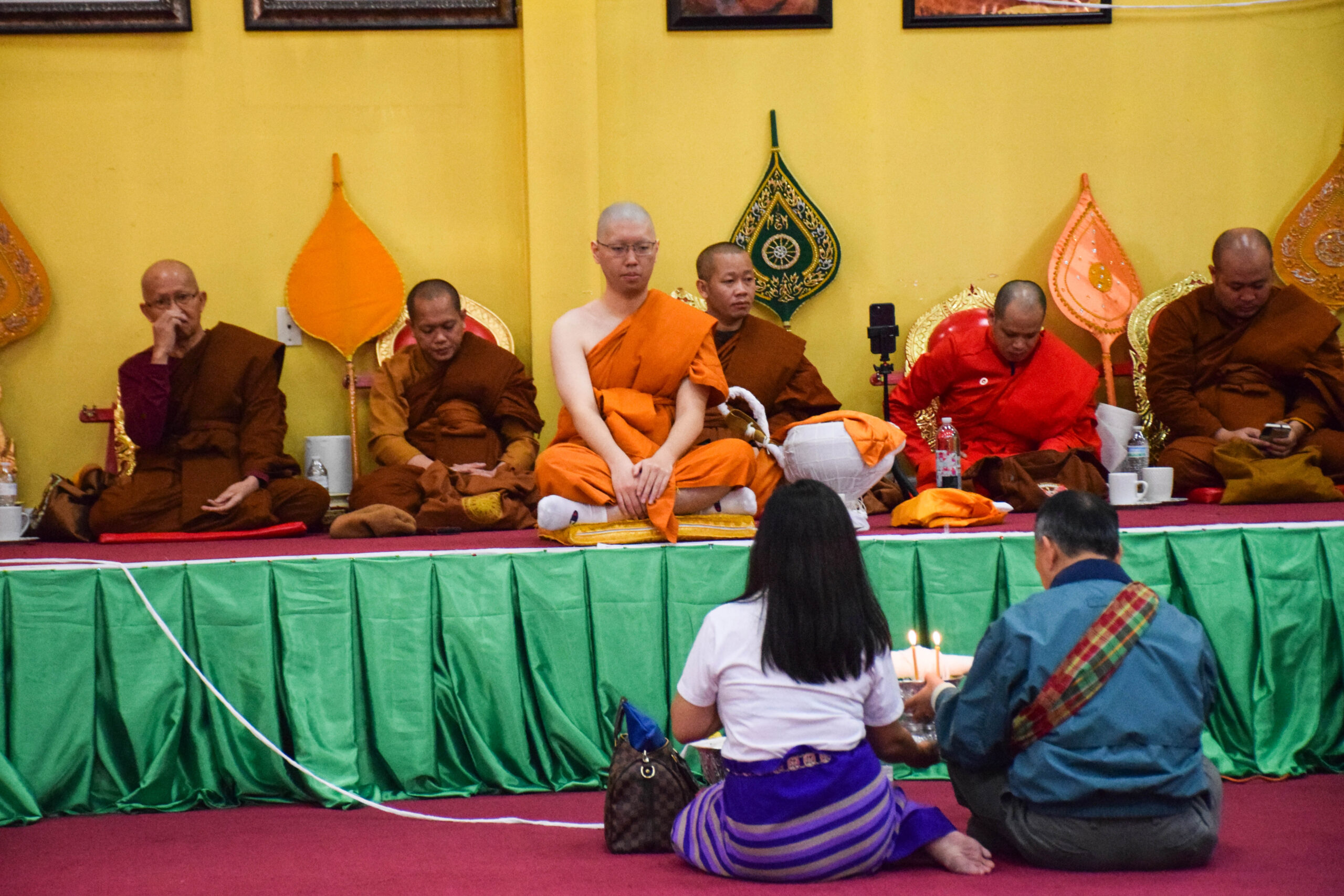 Rachel Iacovone WPLN News
Rachel Iacovone WPLN NewsDon, now wearing the burnt-orange robes, sits with the other monks as his parents, Ann and Lee, join them in prayer.
Don also thought this ritual could help him build a bridge between his Thai heritage and his other friends and family in Murfreesboro.
“I remember growing up, no one knew what Thai culture was. People only knew about Chinese culture and Japanese culture,” he explains. “I don’t want to call it racism, but I grew up with kind of, the indifference and kind of the ignorance around other people. I wasn’t very much aware of my own culture and how to defend it and how to talk about it. And this is my way of deepening my connection to my Thai culture, to better understand and to better talk about with other people.”
During a break in the ceremony, Don’s MTSU colleague, religion professor Rebekka King, says she thinks Don accomplished his goal.
“As a scholar of religion, I’m aware of the temporary ordination rituals, but it’s very rare for members of the community to be able to come and observe something like this. So it’s really a testament to Don’s generous spirit that he has welcomed his work friends and community members to come and be part of this really special ritual,” King says.
‘There’s rules I have abide by’
By the time the ceremony wraps up, it’s afternoon. For Don, the weight of the week ahead is beginning to sink in.
“It didn’t really hit me until (the ceremony) that there’s rules I have to abide by. There’s things that I will have to do. And following them to the letter will just make my time as a monk successful, as to not let down my parents and let down my family,” he says.
During the ceremony, he exchanged his white robe for a burnt-orange one. Now, he looks just like the other monks.
“I do feel different now,” he says. “Each time I think about myself, I’m still imagining myself with hair. And, you know, I look in the mirror and like, ‘Is this really me?'”
As the guests dig into a feast of fried rice, green curry and deep-fried spring rolls, Don begins his mandatory fast.
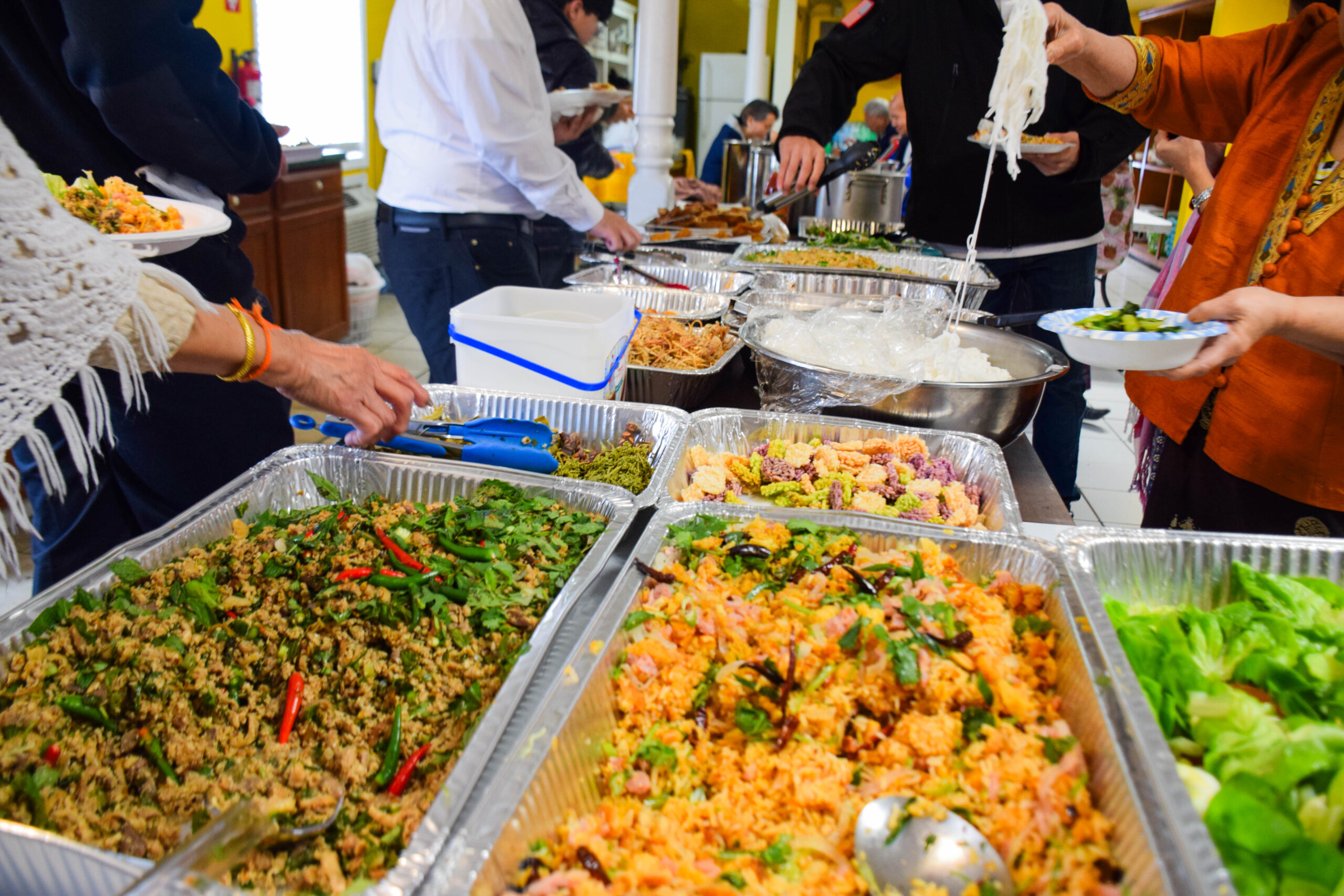 Rachel Iacovone WPLN News
Rachel Iacovone WPLN NewsDon’s family provided more than a dozen Thai and Lao dishes. A heroic family friend, who came in for the ceremony from Atlanta, did most of the cooking.
Don’s week at the temple
After the crowds left and Don settled into his home for the week, he recorded the first in a series of audio diaries about his experience.
 Rachel Iacovone WPLN News
Rachel Iacovone WPLN NewsThe main gathering room of the temple, which is Don’s home for the week.
In the opening hours of his journey as a monk, the task ahead of him loomed large: learn the rules — all of them — and obey.
As the week progressed, Don began to adapt. One monk taught him walking meditation — a practice of paying close attention to, literally, one step at a time. He was also assigned passages of the Buddhist Pali Canon to read and was expected to memorize some of the most common prayers the monks recite each week.
Don realized he was at a disadvantage compared to people from Thailand who undergo the same ordination. While Buddhist culture and ritual is omnipresent there, it holds little sway in the U.S. Don does not consider himself a practicing Buddhist, and though he grew up in Murfreesboro, he says he visited the temple fewer than two dozen times during his childhood.
He proved a quick study, but the anxiety about failure was hard to shake.
By the end of the week, it became clear that Don had proven himself. He had completed the required reading, and prayers that seemed daunting at first were under his belt.
He was able to turn his focus outward to his thoughts on his week at the temple — and on Buddhism, broadly. The rules felt grating to him, especially the two times he went out into the community with the other monks. The end of the week felt like Don’s farewell to organized religion. Still, he found the deep exploration into Buddhist theology valuable.

